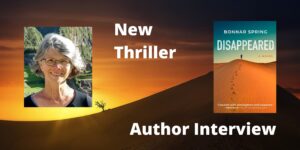The Interview – Part 1
Check back March 15 for Part II
You make a wonderful distinction between “writers” and “storytellers” – writers being able to put words to paper, properly spelled and grammatically correct, while storytellers are able to create a series of connected events leading to a conclusion. Most of us understand how to improve the mechanics of writing, but what are some techniques that can help a writer improve their storytelling?
Thanks. I just think our language did something wrong when we decided to use the word “writing” to mean both the physical act of writing as well as the act of creating stories, because to do one is not necessarily to do the other. Charlie Chaplin, for instance, conceived all of his silent film stories, but he did not write them down. So storytelling can be separate from writing.
Storytelling can be hard for people to learn if they have spent so much of their time learning to “write well” because of where they have chosen to focus their attention.
So how does one get better at storytelling? There are a couple of ways. One way is to not dismiss those storytellers who do this well. If an author sells millions of books on a regular basis they probably do something well, and my guess it has almost nothing to do with comma placement. Study those people. I meet too many plot snobs. Moby-Dick has a plot. Of Mice and Men has a plot. The Adventures of Huckleberry Finn has a plot. To Kill a Mockingbird has a plot. If you are a better writer than Herman Melville, John Steinbeck, Mark Twain, and Harper Lee then by all means don’t have a plot – but everyone else needs one.
Your job as a storyteller is to study plot with the same enthusiasm and commitment you do other aspects of writing.
The good news is that stories are around us all the time. You, and everyone around you, tell stories everyday. The whole world can be your classroom. Listen to how good storytellers in life structure events for maximum effect. What information do they give listeners and what do they hold back for later in the story? You have to become an observer of life. You have to become a Jane Goodall for stories – you have to observe them in their natural habitat, or you can’t truly understand them.
You have to understand what a story is – most writers don’t even have a working definition of what a story is. When you ask them they hem and haw and come up with some hazy, semi-poetic, mumbo-jumbo. Or they fall back on, “Anything can be a story.” That is not a working definition. The first order of business is to be able to define a story in terms that make sense to you and that helps tell you what to do.
At what point in the process do you think a writer should clarify the theme of their work?
This is a tricky question. Rod Serling said that theme leads to characters, then on to plot and I pretty much agree with him. Though I think plot can lead to character as well.
Here’s the thing, I wouldn’t know at all what to write if I wasn’t working to express a theme. You have to have a reason that you are telling this story to people.
This is another reason to observe stories “in the wild.” Most people have a point when they tell a story – they have a theme. Most people don’t come up to you and start telling you things hoping that they will find a theme somewhere in their word salad. No, they almost always have a reason to tell you the story. And everything in the story is in service of that theme, often people state their theme right up front: “If I were you I wouldn’t do business without a contract. One time I was doing a job for a guy and…”
See, there the theme is don’t do business without a contract and everything in the story contributes to arriving at that conclusion. If you want to know how to tell stories you have to look at how people tell stories.
No one owes you their attention. Have you ever been talking with someone and as you listen you find yourself unsure of why you are listening? You find yourself thinking, What’s the point? You may nod politely but you really want nothing more than to get away from this person and find someone interesting to talk to.
This is no different when people read stories or watch plays or movies – they pretty quickly want to know what the point is or they get bored.
Have something to say and the other elements will fall into place.
You write screenplays, novellas, non-fiction books on writing, and comic books. How does your process vary between genres?
I have to be honest about my “novella” – it’s an unproduced screenplay we called “a novella in screenplay form.” However, for me, a story is a story. Each medium has its strengths and weakness and I try to be aware of what those are. For instance in comic books, there is great power in the page flip because it can work as a reveal. I did a book years ago called Harry the Cop where one of our goals (the artist Wayne Cash and I) was to take full advantage of the page flips to reveal a surprise with every turn on the page. So you learn how to play to the strengths of the medium you are working in. But with all stories, I try to start with a theme and try to find the best ways to dramatize that theme though story.
*Click on Wayne Cash’s name to visit his website
What do you know now you wish you’d known when you started your writing career?
That I was starting a writing career. Really. I just wanted to make movies and only wrote because I had to have scripts to make the movies from. To this day I think of myself as a filmmaker rather than a writer. I think that’s why I think of storytelling as separate from writing. I was always obsessed with stories, though.
I was never one of those people who chose to do things; it really feels like these things chose me. I was compelled to do them. If I had known how hard it was going to be I’m not sure it would have made a difference, so I guess I’m glad I didn’t know what to expect.
To Be Continued…



Great interview! I heartily agree with your point on having to know what you're trying to say, Brian. It might take a while to find it for some people, but once you've found what you need to stay, it makes sense to build the rest of your story around the point. Otherwise, what's to stop the reader/audience from getting bored? Really good stuff! Thanks for featuring this, Elena!
Ah, yes the story is the thing. And thank you for the insight into theme. I consider myself a fair hand at telling the story and labor intently on plot. Now I see I need to work on putting theme at the forefront. Often I choose character first, put them in a situation from which they must win or lose and build the plot from that platform. I seem to have let the theme arrive on riding the plot. I can always tell you the plot in one sentence, but now I see I must give theme a solid seat in the saddle before mounting the steed of the story.
What a great point about the definition of story. Brian McDonald is awesome & I'm so excited to be organizing a class by him through Women in Film Seattle & Reel Grrls. If anyone is interested it's happening April 28th & 29th in Seattle. Here's the link: http://womeninfilmseattle.org/workshops.htm. Email me ([email protected]) to find out more. Thanks for reading!